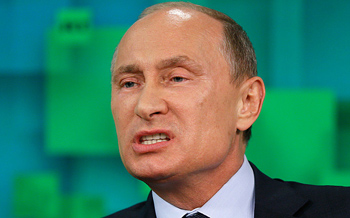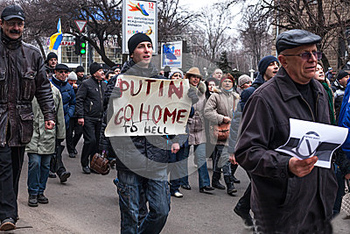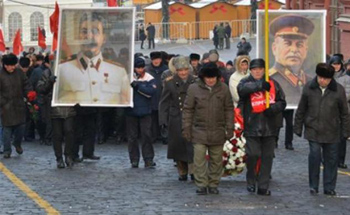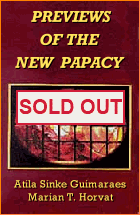International Affairs
 |
 |
 |
 |
 |
 |
 |
The Vulnerability of Putin & His Bomb
The media have been alive with reports that Russian president Vladimir Putin was ready to use atomic weapons if the West forcefully intervened to prevent Moscow's annexation of the Crimean peninsula, a part of the nation of Ukraine. Putin's use of force and his readiness to resort to nuclear weapons indicate what is at stake for Moscow in the annexation of Crimea and in eastern Ukraine as well.
Putin is vulnerable in this struggle, and he knows it.
 In a documentary aired in Russia on Sunday, March 15, 2015, Putin admitted that Russian forces had been operating inside Crimea before the annexation, a reality that had been previously denied. Putin also acknowledged that the Russian military assisted Vicktor Yanukovich, the ousted president of Ukraine, to flee to Russia.
In a documentary aired in Russia on Sunday, March 15, 2015, Putin admitted that Russian forces had been operating inside Crimea before the annexation, a reality that had been previously denied. Putin also acknowledged that the Russian military assisted Vicktor Yanukovich, the ousted president of Ukraine, to flee to Russia.
Putin repeated the claim that the United States was behind the ouster of Yanukovich. The Kremlin has consistently asserted that the United States is behind all pro-democracy activities in Ukraine, accusing the U.S. of plotting for decades to foment Ukrainian hostility to Moscow.
Completely ignored by Moscow is the strong Ukrainian sentiment to remain independent of Russia after centuries of Russian domination. Ukraine was part of the Tsarist Empire and, then, a "republic" within the Soviet Union. During the Soviet era, Ukraine suffered from the Great Famine, known to the Ukrainians as the Holodomor, an atrocity instigated by then-Soviet dictator Josef Stalin. The estimates of the dead range up to 10 million during the man-made famine, which reached its peak during the years 1932-33.
Despite the Holodomor and consistent Soviet oppression of Ukrainian speech and culture, the Ukrainian people maintained their identity as a people apart from their Russian oppressors. In reality, Yanukovich was forced out because his policies were drawing Ukraine again into a tight – virtual satellite – relationship with Russia.
More is at stake for Moscow, however, than simply the control of Ukraine.
Putin was willing to risk a nuclear confrontation to protect his annexation of Crimea for several reasons. Supposedly Moscow invaded Crimea to "protect" Russians living in the peninsula. The most obvious threat to Russia was that a pro-Western Ukraine would no longer allow Russia's Black Sea fleet to harbor at the Crimean port of Sevastopol. Without this vital port, Russia's military reach into the Mediterranean would be blunted, an embarrassing blow to Putin's expansionist dreams.
Much more importantly, however, is that Moscow had to take swift action to counter the influence of Ukraine's blossoming Western-style democracy, with the promise of reasonably honest elections, truly open markets and the rejection of Ukrainian participation in Putin's neo-Soviet revival.
 Russia's counter to Ukraine's pro-Western revolution continues at this writing. Not only has Crimea become a full member of the Russian federation (the city of Sevastopol is a federal city, while the remainder of Crimea is a "republic"), but Russia is deeply involved in the rebellion of pro-Russian sections of eastern Ukraine against the government in Kiev.
Russia's counter to Ukraine's pro-Western revolution continues at this writing. Not only has Crimea become a full member of the Russian federation (the city of Sevastopol is a federal city, while the remainder of Crimea is a "republic"), but Russia is deeply involved in the rebellion of pro-Russian sections of eastern Ukraine against the government in Kiev.
The political atmosphere of the pro-Russian rebels is clearly demonstrated by the invitation extended by leaders of the "Donetsk People’s Republic" to the Russian Communist Party for "support" in establishing a functioning government.
Moscow sees its intervention in Crimea and eastern Ukraine as absolutely vital to its interests. The threat to the Kremlin oligarchy is real and palpable.
Since the collapse of the Soviet Union, there has been a cleansing of the image of the old Soviet Union and Soviet figures, even the mass murderer Joseph Stalin. These efforts are directed to the restoration of a new, re-formed Communist State.
All of this is put at risk by the pro-Western, pro-democracy movement in Ukraine. The deep cultural, linguistic and social ties that have been forged over the centuries could now carry a message of human freedom into Russia which could be fatal to the Kremlin's dreams of some sort of Soviet revival.
 The Kremlin is so invested in its actions in Ukraine that it is willing to endanger the financial, commercial and political ties to the West made since the end of the Soviet Union.
In a move to counter potentially crippling Western sanctions imposed after the annexation of Crimea and in response to Russian intervention in eastern Ukraine, the Kremlin is engaged in a "turning to the East." Russian trade and investment, which once flowed toward the United States and Western Europe, is now being redirected toward China and organizations in which both Russia and China participate, most prominently the BRICKS group (Brazil, Russia, India, China, Kazakhstan, and South Africa) and the larger Shanghai Cooperation Organization (SCO). The SCO, it may be noted, also includes Iran as an associate member.
The Kremlin is so invested in its actions in Ukraine that it is willing to endanger the financial, commercial and political ties to the West made since the end of the Soviet Union.
In a move to counter potentially crippling Western sanctions imposed after the annexation of Crimea and in response to Russian intervention in eastern Ukraine, the Kremlin is engaged in a "turning to the East." Russian trade and investment, which once flowed toward the United States and Western Europe, is now being redirected toward China and organizations in which both Russia and China participate, most prominently the BRICKS group (Brazil, Russia, India, China, Kazakhstan, and South Africa) and the larger Shanghai Cooperation Organization (SCO). The SCO, it may be noted, also includes Iran as an associate member.
Moscow is also attempting to weaken the Western alliance (already fraught with indecision and a lack of resolve), with the suggestion that Germany, Europe's strongest economy, jettison its ties with the United States and its Europe allies and join the BRICKS group or engage in some other form of close non-Western commercial ties.
How German leaders will ultimately respond to such suggestions remains unknown, but what is clear is that Putin and the Kremlin oligarchy fear the pro-democracy movement in Ukraine, and they are willing to take considerable risks, both financial and military, to limit or destroy it.
The existence of God-given human freedom is anathema to Putin and the Kremlin oligarchy, and they will go to any length to destroy it.

Toby Westerman publishes
International News Analysis - Today
An uncompromising weekly analysis of the world situation
Contact T. Westerman at
www.inatoday.com
or P.O. BOX 5182, Rockford, ILL, 61125-0182
Putin is vulnerable in this struggle, and he knows it.

A belligerent Putin in the recent documentary
Putin repeated the claim that the United States was behind the ouster of Yanukovich. The Kremlin has consistently asserted that the United States is behind all pro-democracy activities in Ukraine, accusing the U.S. of plotting for decades to foment Ukrainian hostility to Moscow.
Completely ignored by Moscow is the strong Ukrainian sentiment to remain independent of Russia after centuries of Russian domination. Ukraine was part of the Tsarist Empire and, then, a "republic" within the Soviet Union. During the Soviet era, Ukraine suffered from the Great Famine, known to the Ukrainians as the Holodomor, an atrocity instigated by then-Soviet dictator Josef Stalin. The estimates of the dead range up to 10 million during the man-made famine, which reached its peak during the years 1932-33.
Despite the Holodomor and consistent Soviet oppression of Ukrainian speech and culture, the Ukrainian people maintained their identity as a people apart from their Russian oppressors. In reality, Yanukovich was forced out because his policies were drawing Ukraine again into a tight – virtual satellite – relationship with Russia.
More is at stake for Moscow, however, than simply the control of Ukraine.
Putin was willing to risk a nuclear confrontation to protect his annexation of Crimea for several reasons. Supposedly Moscow invaded Crimea to "protect" Russians living in the peninsula. The most obvious threat to Russia was that a pro-Western Ukraine would no longer allow Russia's Black Sea fleet to harbor at the Crimean port of Sevastopol. Without this vital port, Russia's military reach into the Mediterranean would be blunted, an embarrassing blow to Putin's expansionist dreams.
Much more importantly, however, is that Moscow had to take swift action to counter the influence of Ukraine's blossoming Western-style democracy, with the promise of reasonably honest elections, truly open markets and the rejection of Ukrainian participation in Putin's neo-Soviet revival.

One of the mass anti-Putin protestest in Khorkov
The political atmosphere of the pro-Russian rebels is clearly demonstrated by the invitation extended by leaders of the "Donetsk People’s Republic" to the Russian Communist Party for "support" in establishing a functioning government.
Moscow sees its intervention in Crimea and eastern Ukraine as absolutely vital to its interests. The threat to the Kremlin oligarchy is real and palpable.
Since the collapse of the Soviet Union, there has been a cleansing of the image of the old Soviet Union and Soviet figures, even the mass murderer Joseph Stalin. These efforts are directed to the restoration of a new, re-formed Communist State.
All of this is put at risk by the pro-Western, pro-democracy movement in Ukraine. The deep cultural, linguistic and social ties that have been forged over the centuries could now carry a message of human freedom into Russia which could be fatal to the Kremlin's dreams of some sort of Soviet revival.

A public procession honoring Stalin's anniversary in downtown Moscow
Moscow is also attempting to weaken the Western alliance (already fraught with indecision and a lack of resolve), with the suggestion that Germany, Europe's strongest economy, jettison its ties with the United States and its Europe allies and join the BRICKS group or engage in some other form of close non-Western commercial ties.
How German leaders will ultimately respond to such suggestions remains unknown, but what is clear is that Putin and the Kremlin oligarchy fear the pro-democracy movement in Ukraine, and they are willing to take considerable risks, both financial and military, to limit or destroy it.
The existence of God-given human freedom is anathema to Putin and the Kremlin oligarchy, and they will go to any length to destroy it.

Posted March 20, 2015
International News Analysis - Today
An uncompromising weekly analysis of the world situation
Contact T. Westerman at
www.inatoday.com
or P.O. BOX 5182, Rockford, ILL, 61125-0182
______________________
______________________











